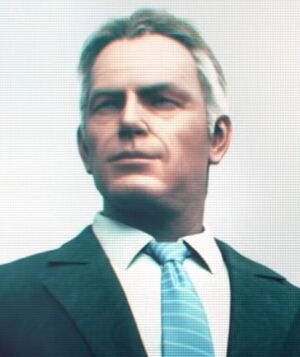Chancellor of Brumen
This article is incomplete because it is pending further input from participants, or it is a work-in-progress by one author. Please comment on this article's talk page to share your input, comments and questions. Note: To contribute to this article, you may need to seek help from the author(s) of this page. |
| Chancellor of the Kingdom of Brumen | |
|---|---|
| Kanzler des Königreich Brumen | |
 Royal Arms of Her Majesty's Government | |
 Flag of Brumen | |
| Executive Branch of the Government | |
| Style | The Honourable (Formal) His Excellency (Diplomatic) Mr. Chancellor (Informal) |
| Status | Head of Government |
| Member of | Parliament Royal Cabinet Royal Council Royal Security Committee |
| Reports to | Monarch of Brumen Parliament |
| Seat | Dinsmark |
| Nominator | Congress of the Realm |
| Appointer | Monarch of Brumen |
| Term length | At Her Majesty's pleasure |
| Constituting instrument | Articles of Union |
| Formation | 24 April 1850 |
| Deputy | Vice Chancellor of Brumen |
| Salary | $250,000 |
The chancellor of Brumen, officially the chancellor of the Kingdom of Brumen, is the head of government of the Kingdom of Brumen and serves, on behalf of Brumen's Monarch, as the commander-in-chief of Brumen's Armed Forces. The chancellor is nominated by the Congress of the Realm as the person who commands the confidence of parliament. This is generally the leader of the largest party in parliament who has successfully formed government, be it by majority or through a coalition agreement. Once nomination by Congress has been confirmed, the Chancellor-nominee would seek an audience with the Monarch of Brumen to seek their formal appointment as Chancellor and permission to form government. Aside from sitting as a member of parliament (MP) the chancellor also leads various high offices in the federal government such as, but not limited to the: Royal Cabinet, Royal Council & Royal Security Council. The incumbent chancellor is Immanuel von Dinsmark who has been in office since 15 December 2007.
History
The office and position of chancellor of Brumen was established in the aftermath of the Second Insurrection, a period of civil war that resulted in the democratization of Brumen. One of the many grievances which triggered the insurrection was the centralization of executive power in the Monarch. While some powers of the Monarch was ceded to the Oberhaus after the First Insurrection, Monarchs of Brumen continue to enjoy near total control over all executive functions of the government. As part of the peace treaty in the aftermath of the Second Insurrection, most executive powers were transferred to the office & position of chancellor.
